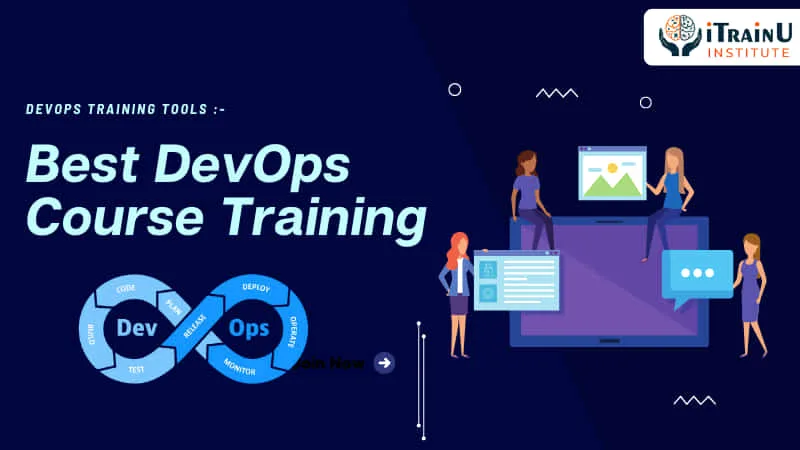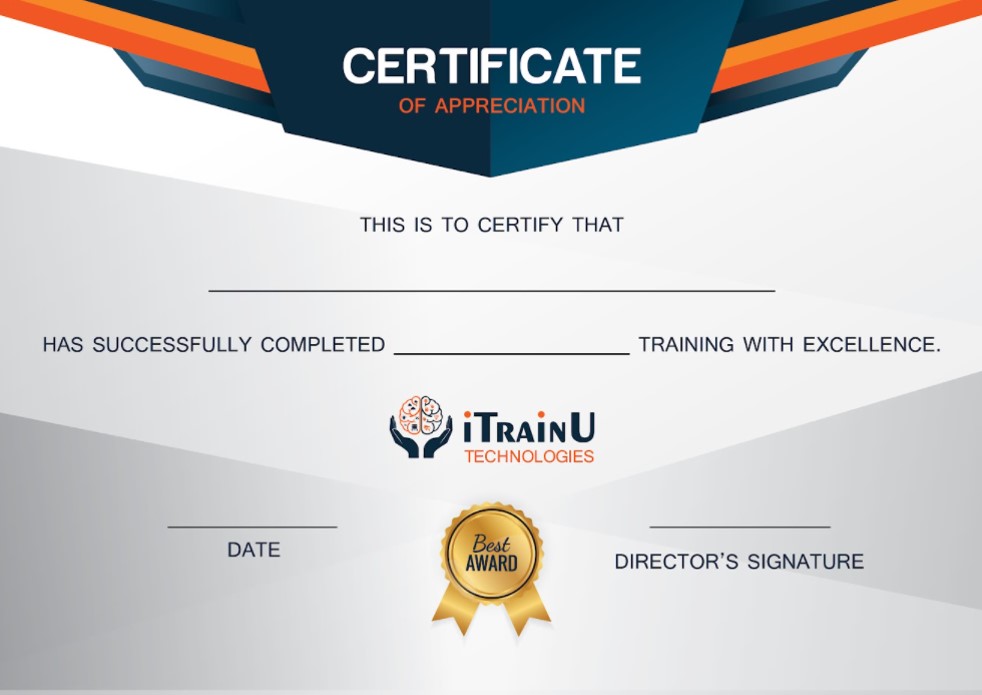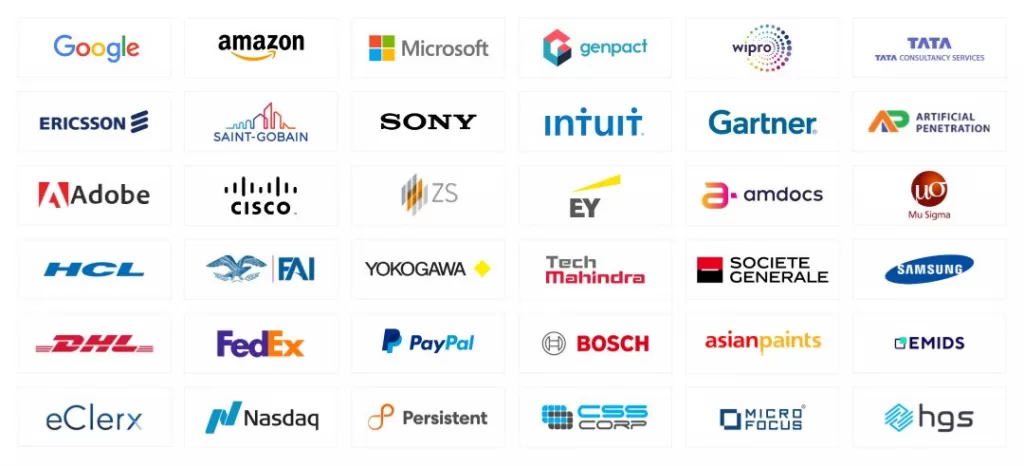Our DevOps Training course is suitable for IT professionals, software developers, system administrators, and anyone interested in bridging the gap between development and operations while advancing their career in IT.

Overview of DevOps Course In Indore
iTrainU Institute is a leading DevOps training institute in Indore. Our DevOps training in Indore covers essential topics like Linux, cloud computing, Git, Docker, Ansible, Puppet, and more, helping you develop strong practical skills.
DevOps, which combines “development” and “operations,” is aimed at streamlining the software development and delivery process. During our DevOps training in Indore, you’ll complete regular assignments and work on real projects to apply your knowledge.
We provide a globally recognized DevOps certification, and our experienced trainers ensure that our DevOps training in Indore prepares you for real-world scenarios.
Is there a certification provided upon completion of the DevOps training in Indore?
Yes, upon successful completion of our DevOps training in Indore, you will receive a recognized certification that validates your expertise in DevOps practices and tools. This certification can enhance your job prospects and career advancement opportunities.
How can I enroll in the DevOps training course in Indore?
You can enroll in our DevOps course by visiting our website, filling out the Enquiry form, and following the registration instructions. For any specific queries or assistance, please contact our enrollment team or visit our branch.
What tools and technologies will I learn during DevOps training in Indore?
You’ll typically learn a range of DevOps tools, including Git, Jenkins, Docker, Kubernetes, Terraform, Ansible, and various monitoring and logging solutions.
Can I take DevOps training online or in a classroom setting in Indore?
Yes, Both options are available in Indore. You can choose between DevOps online training, which offers flexibility, and classroom training, which provides face-to-face interaction with instructors.
Tools Covered In DevOps Training
DevOps Course Syllabus In Indore
LINUX Basics: (RHCSA , RHCE)
• Basic linux/unix commands
• Changing file permissions and ownership
• Filter commands
• Simple filter and advance filter commands
• Start and stop services
• Find and kill the process with id and name
• Package installation using RPM and YUM
• Basic Servers and advance servers
• Automation Technologies with Ansible Tools
Introduction to DevOps
• What is DevOps
• SDLC models, Lean, ITIL, Agile
• Why DevOps?
• History of DevOps
• DevOps Stakeholders
• DevOps Goals
• DevOps perspective
• DevOps and Agile
• DevOps Tools
• Configuration management
• Continuous Integration and Deployment
Introduction to Cloud computing
• Characteristics of cloud computing
• Cloud implementation models
• Advantages of cloud computing
• Concerns of cloud computing
GIT: Version Control
Introduction
- What is Git
- About Version Control System and Types
- Difference between CVCS and DVCS
- A short history of GIT
- GIT Basics
- GIT Command Line
Installing Git
Git Essentials
- Creating repository
- Cloning, check-in and committing
- Fetch pull and remote
- Branching
- Creating the Branches, switching the branches, merging the branches.
Chef for Configuration Management
Overview of Chef
- Common Chef Terminology (Server)
- Workstation, Client, Repository etc.)
- Servers and Nodes
- Chef Configuration Concepts
Organization Setup
- Create organization
- Add yourself and node to organization
Node Objects and Search
- How to Add Run list to Node
- Check node Details
Roles
- Create roles
- Add Roles to organization
Data bags
- Understanding the data bags
- Creating and managing the data bags
Workstation Setup
- How to configure knife
- Execute some commands to test connection between knife and workstation
Test Node Setup
- Create a server and add to organization
- Check node details using knife
Environments
- How to create Environments
- Add servers to environments
Attributes
- Understanding of Attributes
- Creating Custom Attributes
- Defining in Cookbooks
- Creating the data bags using CLI and Chef Console
- Sample data bags for Creating Users
Puppet for Configuration Management
What is Puppet?
- How puppet works
- Puppet Architecture
- Master and Agents
- Puppet terminology and about Manifests
Puppet Master
- Puppet configuration files
Templates
- Static Contents Explosion
- Using Dynamic Content with Templates
- Templates Overview
- ERB
Example Code Manifests/Modules
- NTP Module
- Users Module
- SSH
- Sudo
Puppet Forge
- Understanding the Puppet Forge
- Module structure
- Install LAMP with preexisting modules
- Installing Apache Tomcat with Puppet Modules
Installation and Configuration
- Installing Puppet
- Configuring Puppet Master and Agent
- Connecting Agents
Puppet Language Basics
- The declarative language
- Resources
- Using Basic resources like file,exec,package service
- Resource Collectors
- Virtual Resources
- Exported Resources
- Manifests
- Modules and Classes
- Class Parameters
- Defined Type
Jenkins – Continuous Integration
Introduction
- Understanding continuous integration
- Introduction about Jenkins
- Build Cycle
- Jenkins Architecture
Build Deployments
- Understanding Deployment
- Tomcat installation and configuration
Securing Jenkins
- Authentication
- Jenkins Plugin
- Authorization
- Confidentiality
- Creating users
- Best Practices for Jenkins
Installation
- Obtaining and installing Jenkins
- Installing and configuring Jenkins using WAR and RPM
- Java installation and configuration
- Maven Installation
- Exploring Jenkins Dashboard
Jobs
- Creating Jobs
- Running the Jobs
- Setting up the global environments for Jobs
- Adding and updating Plugins
- Disabling and deleting jobs
Docker– Containers
Introduction
- What is a Docker
- Use case of Docker
- Platforms for Docker
- Dockers vs. Virtualization
Docker Hub
- Downloading Docker images.
- Uploading the images in Docker Registry and AWS ECS
- Understanding the containers
- Running commands in container
- Running multiple containers
Architecture
- Docker Architecture.
- Understanding the Docker components
Custom imagest
- Creating a custom image.
- Running a container from the custom image
- Publishing the custom image
Installation
- Installing Docker on Linux
- Understanding Installation of Docker on windows.
- Some Docker commands.
- Provisioning
Docker Networking
- Accessing containers
- Linking containers
- Exposing container ports
- Container Routing
Docker Compose
- Installing The Docker compose
- Terminology in Docker compose
- Build word press site using Docker compose
Nagois
Introduction
- About Monitoring tools
- About New Relic
- Installing and Configuring New Relic
- Application Monitoring using New Relic
- Server Monitoring using New Relic
- Alerts policies
Kubernetes
- Introduction To Kubernetes
- Environment Setup and Configuration
- High Availability
- Running Code in Kubernetes
- Container Life Cycles
- Background Processing in Kubernetes
- Integration with Continuous Delivery
- Logging and Monitoring
- Troubleshooting
Maven
Maven Overview
What Maven Provide?
Coherent Organization of Dependencies
- Local Maven repository
- Central Maven repository
- Remote Maven Repository
- Locating dependency artifacts
Maven
Mavens Principles
Maven's Benefits
Maven Environment SetUp
- System Requirement
- java installation verification
- Set JAVA environment
- Download Maven Archive
- Extract Maven Archive and Configure Maven Environment Variables
- Add Maven bin directory location to system path and verify Maven installation
Maven Origins
Declarative Execution
- Maven’s project object model (POM)
- Maven’s build life cycle
- Create Java Project
- Maven 2 Eclipse Plugin
- Generate Documentation for Maven Project
- Team Collaboration with Maven
- Build and Test Java Project
- External Dependencies
- Create web application using maven
- Project Creation from Maven Templates
- Migrating to Maven
Upcoming Batch For DevOps Training In Indore
Duration |
Timings |
|---|---|
| (Mon – Sat) 45 Days | 7:00 AM to 8:00 AM |
| (Mon – Sat) 45 Days | 7:00 PM to 8:00 PM |
Devops Training Certification In Indore
Our DevOps training in Indore is carefully crafted by an expert trainer to help you easily pass the DevOps exam. The program includes live projects and hands-on labs, giving you practical experience through assignments.
We offer a balanced approach, combining both practical and theoretical DevOps training in Indore. Our trainer not only explains the concepts but also guides you through hands-on projects with DevOps tools, helping you build real-world skills.
This DevOps training in Indore leads to a globally recognized certification that adds significant value to your resume, improving your chances of getting interviews with top companies and setting you up for higher-level roles.
After successfully completing the practical training and assignments, you will receive a DevOps certification that validates your skills and enhances your career opportunities

Why Learn Online DevOps Training With iTrainU?
Our Students Placed

DevOps Training Frequently Asked Questions (FAQ)
What is DevOps?
DevOps is a set of practices and cultural philosophies that aims to improve collaboration between software development (Dev) and IT operations (Ops) teams. It emphasizes automation, continuous integration and delivery, faster software releases, and a culture of collaboration.
What coding skills are useful in DevOps?
Proficiency in scripting languages like Python, Bash, PowerShell, or Ruby can be valuable in DevOps. These languages are commonly used for writing automation scripts, creating deployment pipelines, and managing infrastructure through code. Additionally, familiarity with version control systems like Git is essential for collaborating on code changes and managing configuration.
Is DevOps suitable for beginners or those with experience?
DevOps can be pursued by both beginners and experienced professionals. Beginners can start by learning foundational concepts and gradually gaining hands-on experience. Experienced professionals can leverage their existing skills to transition into DevOps roles.
What is the DevOps Course Salary in India?
Entry-Level (0-2 years of experience): Entry-level DevOps professionals who have completed a course might expect a salary ranging from around ₹3,00,000 to ₹6,00,000 per year.
Mid-Level (2-5 years of experience): DevOps professionals with a few years of experience and relevant training could earn salaries ranging from ₹6,00,000 to ₹12,00,000 per year.
Experienced (5+ years of experience): For DevOps professionals with several years of experience and expertise, salaries could range from ₹12,00,000 to ₹20,00,000 or more per year.
What are the key principles of DevOps Training ?
Key principles of DevOps include automation, collaboration, continuous integration, continuous delivery/deployment, and monitoring.





